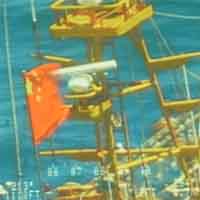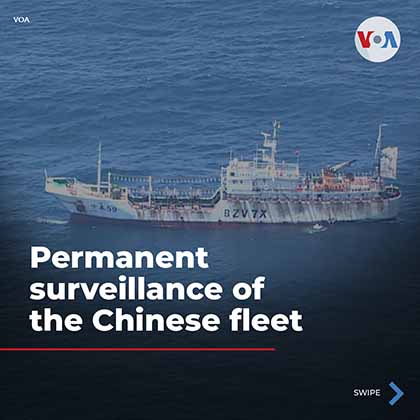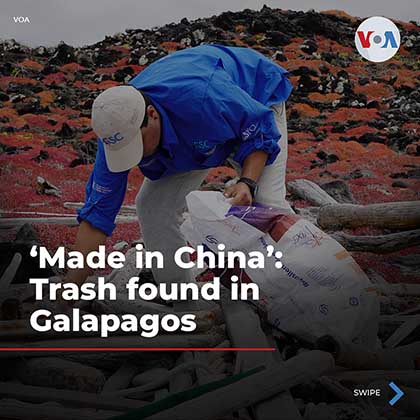Episode 1
The Chinese fishing fleet and the threat to the Galapagos
Biologists and local fishermen say there is a fleet of 300 Chinese boats that fish intensively on the outskirts of the Galapagos Islands. Voice of America went to the region to examine the impact Chinese fishing is having on this unique ecosystem. Jaime Moreno has the story.
Select an episode
The Galapagos Marine Reserve is a sanctuary of 3,500 species
Three ocean currents converge in the archipelago: the cold Humboldt Current from Peru; a warm current that comes from Panama; Cromwell Current, rich in nutrients.
The Galapagos Marine Reserve
The Galapagos Marine Reserve was created in 1998 and is a massive 138,000-square-kilometers. On January 15, 2022, Ecuadorian President Guillermo Lasso signed a resolution to expand the marine reserve from the original 138,000-square kilometers to 198,000-square kilometers.
The Chinese fleet course from 2016 to 2020
The first Chinese fleet found west of the Galapagos Islands was detected in 2016. In 2020, the size of the industrial fishing fleet for giant squid in Latin American international waters had reached 615 vessels. Monitoring platform Global Fishing Watch says 95% of the boats have Chinese flags, and half of them operate most of the year west of the Galapagos archipelago.
Ecuadorian minister of environment: ‘It’s aggressive fishing’
The Ecuadorian government monitors fishing closures and regulates activity within its national waters, but it has no control over the Chinese fleet because it is located in international waters.
 Gustavo Manrique Miranda
Minister of Environment of Ecuador
“Any intensive extractive activity that does not consider sizes, seasons, species closures and others should be of particular concern. And a fleet of 270 international ships is alarming,” said Gustavo Manrique Miranda, Ecuador’s minister of the environment, who also views the activity of the Chinese fleet with worry and shares the fears of local biologists and fishermen.
Gustavo Manrique Miranda
Minister of Environment of Ecuador
“Any intensive extractive activity that does not consider sizes, seasons, species closures and others should be of particular concern. And a fleet of 270 international ships is alarming,” said Gustavo Manrique Miranda, Ecuador’s minister of the environment, who also views the activity of the Chinese fleet with worry and shares the fears of local biologists and fishermen.
“It is an aggressive, extractive fishing of great volume that Ecuador is working to regulate, but I insist, they are international conventions and agreements in international waters,” he said.

Chen Guoyou, Chinese Ambassador to Ecuador
The Chinese ambassador
Voice of America asked the Chinese ambassador to Ecuador, Chen Guoyou, about the Chinese fleet’s fishing operation near Galapagos. The diplomat said they are interested in protecting marine species in areas where they fish.
“To effectively protect marine fisheries resources and promote their long-term sustainable development, China has imposed a voluntary three-month moratorium on fishing in the Southeast Pacific and Southwest Atlantic oceans since last year.” The moratorium mentioned by Guoyou occurs between September and November of each year west of the Galapagos. However, that time of year is usually not appropriate for fishing for giant squid outside the Galapagos because the species moves toward the coast of Peru.
The Chinese fishing mission
“When you look at the migratory patterns of the fish, that’s where you see them (the Chinese fleet) go over and over again, year after year,” explained Ambassador Jane Manes, charge d’affaires of the U.S. Embassy in El Salvador, who is an expert on unregulated fishing matters and has closely followed the expansion strategy of the Chinese fleet in the world and the region.
Overfishing in Asia
The Chinese fishing fleet travels farther and farther to replace the species it no longer finds in its own national waters. Over the last five years, they reached the west of the Galapagos Islands. The fleet is getting bigger and bigger, fishing for months, and the number of marine resources they take out of the ocean is a mystery.
 Jane Manes
Chargé d’affaires to the Republic of El Salvador
Jane Manes
Chargé d’affaires to the Republic of El Salvador
“If you go back and track fishing boats over time, you will see a dramatic increase each year in the dominant large fishing fleets in this hemisphere, which is why this problem is so important. … If we don’t control it now, we know what is going to happen, because you can already see the results of that in Asia and Africa, really – the levels of fish populations and seafood are already on the ground,” Manes warned during an interview with Voice of America.
Ships registered in Panama
The United States government questions the transshipment of cargo on the high seas because ships avoid any control to which regulated industrial fishing fleets are subjected.
“Governance overfishing is just not there. We are not convinced that China, in the case of the People’s Republic of China vessels, is adequately overseeing those boats,” said David Hogan, director in charge of the State Department’s Office of Marine Conservation.
They take the species, but they leave the garbage
Because Chinese vessels last for months without touching port, there is no clarity on how they handle the waste they produce. Since 2016, just when the fleet began operations on the outskirts of Galapagos, hundreds of plastic containers began to reach the beaches of the archipelago.
Galapagos iconic species

One of the main attractions of the archipelago, male adults can weigh up to 250 kilograms.

One of the longest-lived tortoises, it has a life span of more than 100 years and is one of the most threatened species in the region.

One of the most threatened birds on the planet. Many die when they become entangled in the fishing lines of industrial boats.
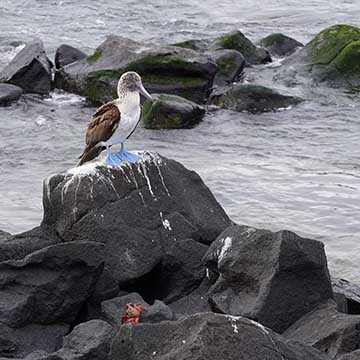
The world’s largest population of this unique bird inhabits The Galapagos Islands.
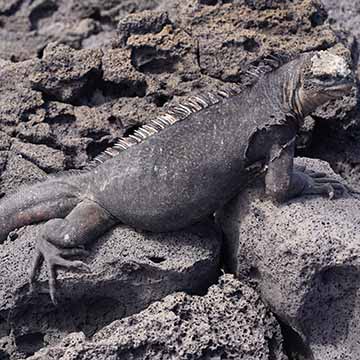
It is the only lizard that swims in the sea and another of the main tourist attractions of the archipelago.

Since 2009, the Galapagos National Park has been monitoring shark breeding sites. As a result, around 35 species, including Punta Negra, have been identified in the archipelago.
(VOA News)
Ecuador balance
Both publicly and through diplomatic channels, the Ecuadorian government has raised concerns about the Chinese fleet operation near Galapagos. It has also asked for support from international organizations, according to Foreign Minister Mauricio Montalvo.
 Mauricio Montalvo
Foreign Minister of Ecuador
Mauricio Montalvo
Foreign Minister of Ecuador
“It’s one of the main things Ecuador has worked on, raising its concern with regional organizations that regulate fishing activities,” said the Ecuadorian foreign minister.
But Ecuador enjoys close relations with China on issues that have nothing to do with fishing in the Galapagos.
More than half of the vaccines applied against COVID-19 are from China, with 8 million doses. In the last four years, exports to China went from $615 million to $3.193 billion in 2020. And both countries are negotiating a possible Free Trade Agreement for 2023.
“The fact that there are concerns regarding the fishery does not imply that Ecuador cannot maintain dialogue on the issues you have mentioned, for example, in the opening of new markets,” Montalvo explained.
The issue of the Chinese fleet is relatively new to Latin America. Ecuador has sought a way to improve its relations with regional navies in other impacted countries to obtain more details about the behavior of the China vessels. Experts say the waters of Asia and Africa have been overfished, and that is why the Chinese fleet has come to this region. Galapagos biologists and activists worry if no action is taken to control the irregular and overcrowded fishing operations, the abundant fish in this region will disappear.





